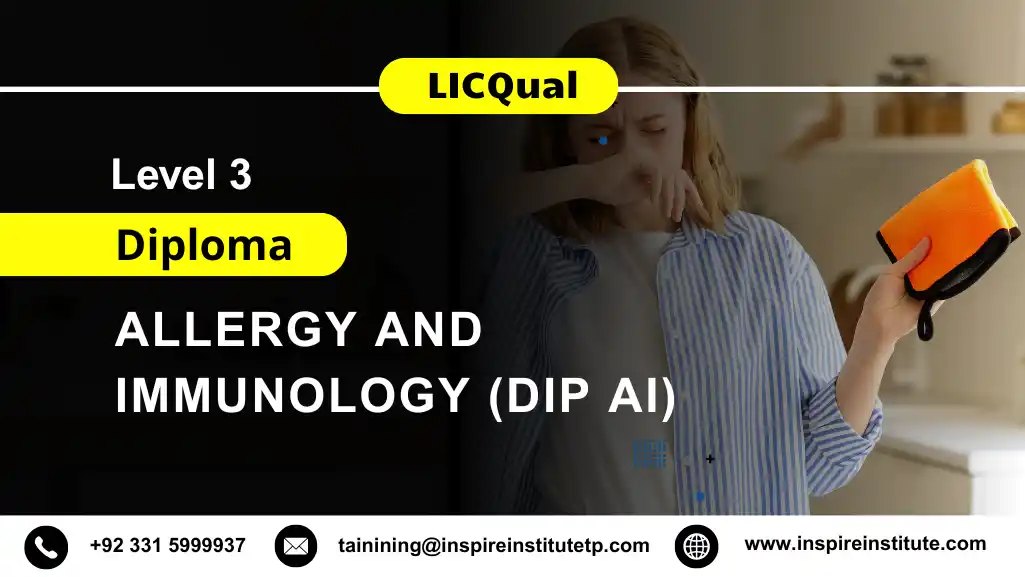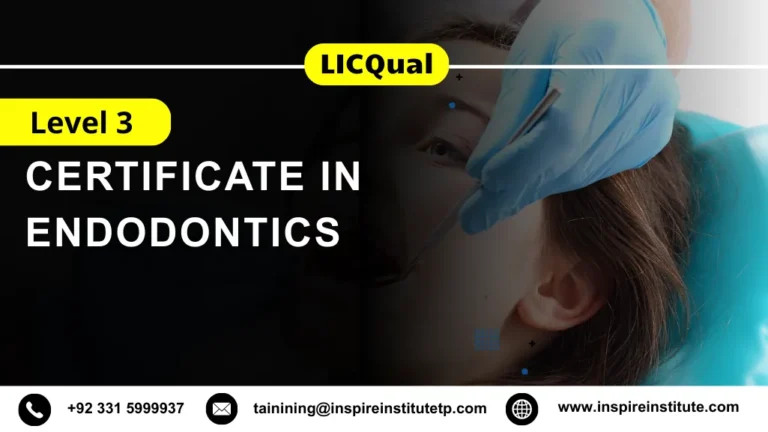LICQual Level 3 Diploma in Allergy and Immunology (Dip AI)
The LICQual Level 3 Diploma in Allergy and Immunology (Dip AI) is a UK-accredited qualification designed for healthcare professionals, nurses, medical assistants, and aspiring clinicians seeking to specialise in allergy and immune system disorders. With allergies and immunological conditions rising globally, this course provides essential knowledge and practical skills to assess, diagnose, and manage these complex health issues. By integrating theoretical understanding with evidence-based practice, learners are prepared to deliver high-quality, patient-centred care across diverse healthcare settings.
This assignment-based programme offers comprehensive coverage of the immune system, hypersensitivity reactions, autoimmune disorders, and the latest diagnostic and treatment approaches in allergy and immunology. Learners explore the mechanisms of immune responses, the triggers of allergic reactions, and the impact of genetics, environment, and lifestyle on immune health. The course equips learners with the ability to apply clinical reasoning and evidence-based practices to improve patient outcomes.
Through this qualification, learners develop practical skills essential for allergy and immunology care, including patient assessment, interpretation of diagnostic tests such as skin prick tests, blood tests, and immunotherapy protocols. Learners gain competence in managing acute and chronic allergic reactions, advising on prevention strategies, and supporting patients in self-management of immune-related conditions. These skills are highly relevant for hospitals, clinics, and community healthcare services.
The LICQual Level 3 Diploma in Allergy and Immunology emphasises evidence-based training, integrating current research, clinical guidelines, and international best practices. Learners engage with up-to-date literature and case studies to enhance diagnostic accuracy, treatment planning, and patient counselling. This ensures graduates deliver safe, effective, and ethical care in line with global healthcare standards.
The flexible, assignment-based structure allows learners to balance professional, academic, and personal responsibilities while progressing at their own pace. It is ideal for healthcare assistants, nurses, medical students, and allied health professionals seeking a structured, yet accessible pathway to specialise in allergy and immunology. This approach promotes lifelong learning and continuous professional development.
Upon completion, graduates can pursue career opportunities in hospitals, allergy clinics, immunology laboratories, and public health organisations. They are equipped to take on roles such as allergy support specialist, immunology assistant, patient educator, or progress to advanced qualifications in clinical immunology, nursing, or healthcare management. The LICQual Level 3 Diploma in Allergy and Immunology (Dip AI) provides the knowledge, practical expertise, and UK-recognised qualification necessary to excel in the growing field of allergy and immune system healthcare.
Why Choose this Qualification
The LICQual Level 3 Diploma in Allergy and Immunology (Dip AI) is an advanced, UK-accredited qualification that offers learners the opportunity to specialise in the rapidly growing fields of allergy and immunology. By combining theoretical knowledge with practical applications, this assignment-based programme equips healthcare professionals, nurses, and aspiring clinicians with the skills, expertise, and confidence needed to assess, diagnose, and manage immune system and allergy-related conditions effectively. This qualification not only enhances professional competence but also prepares learners to contribute meaningfully to patient care and public health in diverse clinical settings.
Key Reasons to Choose this Qualification
Specialist Knowledge:
- Gain a comprehensive understanding of the immune system, hypersensitivity reactions, and autoimmune disorders.
- Learn about common and complex allergic conditions, including food allergies, asthma, eczema, and anaphylaxis.
- Explore the latest diagnostic protocols, immunological tests, and laboratory techniques.
- Understand environmental, genetic, and lifestyle factors affecting immune health.
- Develop the ability to make evidence-based clinical decisions for improved patient outcomes.
Practical Application:
- Acquire hands-on skills in patient assessment, skin prick testing, and immunotherapy procedures.
- Learn to interpret laboratory results such as IgE levels, blood counts, and immune panels.
- Gain experience in developing personalised treatment plans for acute and chronic conditions.
- Enhance patient counselling abilities for allergy prevention and immune system management.
- Apply theoretical knowledge effectively in hospitals, clinics, and community healthcare programmes.
Recognised Qualification:
- Earn a UK-accredited diploma that demonstrates professional competence in allergy and immunology.
- Achieve international recognition, enhancing employability in global healthcare settings.
- Validate your expertise to employers, NGOs, and research institutions worldwide.
- Gain a qualification aligned with international clinical standards and best practices.
- Strengthen professional credibility and career progression opportunities.
Flexible Learning Pathway:
- Progress through an assignment-based structure that fits around professional and personal commitments.
- Study at your own pace while developing clinical and analytical skills.
- Access course materials and submit assignments online for convenient learning.
- Ideal for nurses, healthcare assistants, medical students, and allied health professionals.
- Supports continuous professional development while balancing work and study.
Evidence-Based Training:
- Engage with the latest research, clinical guidelines, and global best practices.
- Develop skills in applying evidence-based interventions and immunological therapies.
- Learn about emerging treatment modalities and innovations in allergy management.
- Understand ethical, safe, and effective care delivery in clinical and community settings.
- Strengthen decision-making skills through analysis of real-world case studies.
Career Development:
- Open doors to roles such as allergy support specialist, immunology assistant, or patient educator.
- Pursue opportunities in hospitals, clinics, laboratories, and public health organisations.
- Build a foundation for further studies in clinical immunology, healthcare management, or nursing.
- Enhance employability by acquiring both practical skills and theoretical expertise.
- Gain a competitive edge in the rapidly expanding field of allergy and immunology.
Enhanced Patient Care Delivery:
- Learn to provide accurate assessments, personalised care plans, and follow-up interventions.
- Develop the ability to manage complex allergy and immune system cases effectively.
- Improve patient education and self-management strategies to enhance outcomes.
- Contribute to holistic, patient-centred care in hospitals and community settings.
- Promote health and wellness by supporting early detection and intervention strategies.
Professional Growth:
- Cultivate critical thinking, clinical reasoning, and effective communication skills.
- Enhance empathy, ethical awareness, and professionalism in sensitive healthcare environments.
- Develop teamwork and leadership capabilities for multidisciplinary clinical settings.
- Strengthen confidence in managing challenging clinical scenarios.
- Prepare to become a competent, ethical, and compassionate allergy and immunology practitioner.
The LICQual Level 3 Diploma in Allergy and Immunology (Dip AI) equips learners with the specialist knowledge, practical expertise, and UK-recognised qualification necessary to excel in allergy and immunology healthcare. By integrating academic learning with real-world application, this course empowers professionals to improve patient outcomes, advance their careers, and make a meaningful impact in the field of immunological health globally.
Course Overview
LICQual UK Awarding Body
Average Completion Time:
4-12 Months
Study Units: 6 Units
Evidence & Assignment Based
Mandatory Units
Who Should Take This Course
The LICQual Level 3 Diploma in Allergy and Immunology (Dip AI) is designed for healthcare professionals, nurses, allied health practitioners, and individuals who want to specialise in allergy and immunology. This UK-accredited, assignment-based programme provides learners with the theoretical knowledge, practical skills, and clinical insight required to assess, manage, and treat patients with immune system disorders and allergic conditions. The course equips learners to apply evidence-based practices confidently across diverse clinical settings, including hospitals, clinics, and community health programmes. It is ideal for those seeking professional development, career progression, and specialised expertise in this rapidly growing field of healthcare.
This course is suitable for
Healthcare Professionals
- Nurses, medical assistants, and allied health practitioners seeking to expand their knowledge in immunology and allergy care.
- Professionals aiming to develop expertise in patient assessment, diagnostic interpretation, and treatment planning.
- Individuals looking to implement evidence-based practices in hospitals, outpatient clinics, or community health settings.
- Practitioners intending to enhance their clinical skills in managing acute and chronic allergic conditions.
- Healthcare staff who want to advance their career in specialised immunology or allergy-focused roles.
Medical Students and Graduates
- Students pursuing medicine, nursing, or biomedical sciences who want specialised knowledge in immunology.
- Graduates seeking practical and clinical skills for assessing and managing allergic reactions and immune disorders.
- Learners aiming to gain a UK-recognised qualification to improve employability and career readiness.
- Individuals interested in integrating theoretical knowledge with applied clinical practice.
- Those preparing for postgraduate studies in immunology, allergy, or related healthcare fields.
Clinical Support Staff
- Laboratory technicians, phlebotomists, and clinical support staff aiming to understand allergy testing and immunological assessments.
- Professionals seeking practical experience in diagnostic techniques such as skin prick tests and blood analysis.
- Staff involved in patient monitoring, immunotherapy, or outpatient support roles.
- Individuals looking to enhance their competence in clinical protocols and patient care procedures.
- Support staff wanting to contribute effectively to multidisciplinary immunology and allergy teams.
Counsellors and Patient Care Coordinators
- Professionals providing guidance and support to patients with chronic allergic conditions.
- Individuals seeking skills in patient education, lifestyle management, and adherence strategies.
- Those involved in planning, monitoring, and implementing treatment protocols.
- Practitioners aiming to improve patient outcomes through counselling and follow-up interventions.
- Staff looking to strengthen communication and empathy in sensitive patient care situations.
Public Health Practitioners
- Individuals involved in allergy awareness campaigns, vaccination programmes, and community health initiatives.
- Professionals aiming to integrate immunology knowledge into preventive healthcare strategies.
- Public health staff seeking to understand the impact of environmental and lifestyle factors on immune health.
- Practitioners interested in contributing to early detection and intervention programmes.
- Those preparing to design or implement community-based health education programmes.
Career Changers and Aspiring Specialists
- Individuals from other healthcare backgrounds seeking to specialise in allergy and immunology.
- Professionals aiming to pivot into a niche healthcare sector with high demand for expertise.
- Learners looking for a flexible, assignment-based programme that fits around existing commitments.
- Those seeking a structured path to gain both theoretical knowledge and practical skills.
- Aspiring specialists who want a UK-recognised qualification to enhance career opportunities.
Research and Academic Professionals
- Researchers aiming to deepen their understanding of immune system disorders and allergies.
- Academics looking to integrate clinical applications into teaching or study programmes.
- Individuals seeking evidence-based knowledge for scientific publications or healthcare research projects.
- Professionals interested in understanding cutting-edge immunology and allergy protocols.
- Staff preparing to contribute to healthcare innovation or policy-making in immunology and allergy care.
The LICQual Level 3 Diploma in Allergy and Immunology (Dip AI) is ideal for a wide range of learners—from healthcare practitioners to aspiring specialists—who wish to develop advanced knowledge, practical skills, and professional competence in allergy and immunology. By completing this programme, learners gain the expertise and confidence to deliver high-quality, evidence-based patient care, advance their careers, and make a meaningful impact in clinical, community, and public health settings. their professional credibility, and contribute to improved patient outcomes in endocrinology and metabolic medicine.
Course Benefits
The LICQual Level 3 Diploma in Allergy and Immunology (Dip AI) offers extensive benefits for learners aiming to build expertise in immune system health, allergy management, and the clinical treatment of immunological disorders. By integrating theoretical foundations with evidence-based practical applications, this UK-accredited qualification equips learners to assess, diagnose, and manage allergic and immune-related conditions effectively. Designed as an assignment-based programme, it provides flexibility, academic excellence, and clinical relevance, supporting professional development for healthcare practitioners, nurses, and aspiring specialists in allergy and immunology.
Key Benefits of the Course:
- Specialist Knowledge:
Gain an in-depth understanding of the immune system, allergy mechanisms, and common immunological disorders such as asthma, eczema, food allergies, and autoimmune conditions. Learners explore diagnostic protocols, immunotherapy approaches, and the impact of environmental and genetic factors on immune health. This knowledge enables graduates to make evidence-based clinical decisions and provide high-quality allergy and immunology care. - Practical Application:
Develop essential clinical skills in patient assessment, interpreting laboratory tests, and supporting allergy treatment plans. Learners gain practical competence in administering immunotherapy, monitoring patient responses, managing acute allergic reactions, and delivering patient education. The course ensures graduates can apply theory effectively within hospitals, allergy clinics, outpatient services, and community healthcare programmes. - Recognised Qualification:
Earn a UK-recognised diploma that validates advanced knowledge and practical skills in allergy and immunology. This internationally recognised qualification enhances professional credibility and career prospects, aligning with global healthcare standards. Graduates can pursue employment in hospitals, research centres, clinics, and public health organisations, reflecting the course’s recognition and value worldwide. - Flexible Learning Pathway:
Delivered through an assignment-based format, the programme allows learners to balance professional or personal responsibilities while advancing academically. This flexibility is ideal for healthcare assistants, nurses, medical students, and career changers seeking structured yet accessible training in allergy and immunology. - Evidence-Based Training:
The course integrates current research, clinical guidelines, and best practices in allergy and immunology. Learners engage with evidence-based approaches to patient care, including immunotherapy protocols, chronic condition management, and preventive health strategies. This ensures graduates adopt safe, effective, and ethical care practices. - Career Development:
This qualification opens diverse career opportunities in hospitals, clinics, research facilities, allergy units, and public health organisations. Graduates can pursue roles such as allergy care specialist, immunology assistant, patient support coordinator, or progress to advanced studies in medicine, nursing, or clinical research. - Enhanced Patient Care Delivery:
Learners develop the expertise to provide patient-centred allergy and immunology care through accurate assessment, treatment planning, and monitoring. Graduates are equipped to manage acute and chronic immune conditions, educate patients, and improve overall health outcomes, contributing meaningfully to public health and community wellness. - Professional Growth:
The programme strengthens clinical reasoning, communication, and teamwork skills essential for effective healthcare delivery. Learners cultivate professionalism, ethical awareness, and critical thinking, preparing them to become confident, compassionate, and competent allergy and immunology practitioners.
The LICQual Level 3 Diploma in Allergy and Immunology (Dip AI) empowers learners with the knowledge, practical skills, and UK-recognised qualification needed to excel in allergy and immunology healthcare. By combining rigorous academic learning with real-world applications, it prepares healthcare professionals and aspiring practitioners to improve patient outcomes, advance their careers, and contribute to global immune health initiatives.es. to advance their careers and play a vital role in promoting global respiratory health.
Eligibility Criteria
The LICQual Level 3 Diploma in Allergy and Immunology (Dip AI) is a UK-accredited qualification specifically designed for healthcare professionals, nurses, medical assistants, and individuals seeking to specialise in allergy care, immunology, and immune system health. This assignment-based programme provides a comprehensive understanding of immune system function, allergy mechanisms, and the clinical management of common and complex allergic and immunological disorders. By combining theoretical knowledge with practical application, the course equips learners with the skills to deliver high-quality, evidence-based allergy and immunology care. Learners who meet the entry requirements will be well-prepared to apply their expertise effectively in hospitals, allergy clinics, immunology units, community health centres, and specialised patient care settings.
Educational Background:
Applicants should hold a recognised qualification in healthcare, nursing, medical sciences, or a related discipline. Candidates with Level 2 or Level 3 qualifications in healthcare practice, biology, physiology, or clinical sciences are encouraged to apply. Individuals with equivalent international qualifications will also be considered, provided their credentials meet the academic and professional standards of the programme. The diploma is particularly suitable for learners with an educational background in health sciences, nursing, or allied healthcare who wish to deepen their understanding and competence in allergy and immunology.
Professional Experience:
Previous professional experience in allergy care, immunology, clinical healthcare, or nursing is beneficial but not mandatory. A minimum of one year’s experience in healthcare or a related field—such as nursing, caregiving, or medical assistance—is recommended. Applicants who have worked in hospitals, allergy units, immunology laboratories, or community healthcare settings will find this qualification particularly valuable. Individuals without prior experience but with a strong interest in allergy and immunology are also encouraged to apply, as the course provides comprehensive foundational and practical training to build competence in this specialised field.
Age Requirement:
Learners must be at least 18 years old at the time of enrolment. This requirement ensures that learners possess the maturity, discipline, and professional responsibility necessary for studying allergy and immunology, which involves complex medical topics, ethical considerations, and patient-centred care. The programme demands commitment, analytical thinking, and clinical reasoning aligned with professional standards for adult healthcare education.
Language Proficiency:
As the LICQual Level 3 Diploma in Allergy and Immunology (Dip AI) is delivered and assessed in English, learners must demonstrate strong proficiency in reading, writing, and communication. Non-native English speakers are expected to hold an IELTS score of at least 6.0 or an equivalent qualification. This ensures learners can effectively engage with technical course materials, complete assignments, and communicate professionally with patients, healthcare colleagues, and academic mentors. Strong English proficiency also supports accurate documentation and the delivery of safe, patient-centred allergy and immunology care.
Technical Requirements:
Applicants should have access to a personal computer or laptop with a reliable internet connection to participate fully in the online learning process. Basic IT literacy is essential, including familiarity with word processing software, digital research tools, and online learning platforms. Since this qualification is assignment-based, learners submit coursework electronically and engage in self-directed study using digital resources. The flexible online structure enables learners to manage their education alongside professional and personal responsibilities.
Required Documents:
To complete the registration process, applicants must provide a valid passport or national identification card for identity verification, along with proof of educational qualifications such as certificates or academic transcripts. Evidence of relevant professional or healthcare experience should also be submitted where applicable. International candidates may be required to submit certified translations of academic or professional documents to verify authenticity and eligibility. These requirements ensure all learners meet the academic, linguistic, and professional standards necessary for successful enrolment in the programme.
The Qualification Process
LICQual Level 3 Diploma in Allergy and Immunology (Dip AI) follows a structured pathway to ensure learners gain comprehensive knowledge, practical skills, and professional competence in community oral healthcare.
Step 1: Self-Assessment
Learners review the entry requirements to confirm eligibility. Candidates with a background in dentistry, oral health, or public health are encouraged to apply.
Step 2: Registration
Complete the registration process by submitting required documents such as proof of qualifications, a valid ID, and payment of enrollment fees.
Step 3: Induction
An induction session is conducted to:
- Verify learner eligibility and documentation.
- Introduce study materials, learning outcomes, and assessment procedures.
Step 4: Learning and Evidence Submission
Learners complete assignments, case studies, and practical exercises demonstrating competence in public health dentistry, community oral health assessment, preventive strategies, and program planning.
Step 5: Feedback and Revision
Assessors review submitted evidence and provide constructive feedback. Learners can revise and resubmit work to meet all required standards.
Step 6: Competence Validation
Final submissions are evaluated to confirm that learners have met all theoretical and practical learning outcomes.
Step 7: Internal Quality Assurance (IQA)
The IQA team reviews the assessment process to ensure accuracy, fairness, and compliance with international standards.
Step 8: External Verification (EQA)
External verifiers validate the authenticity and quality of learner achievements.
Step 9: Certification
Upon successful verification, learners are awarded LICQual Level 3 Diploma in Allergy and Immunology (Dip AI) , demonstrating advanced proficiency in community oral healthcare and preparing them for professional growth in dental public health, preventive dentistry, and healthcare policy.







